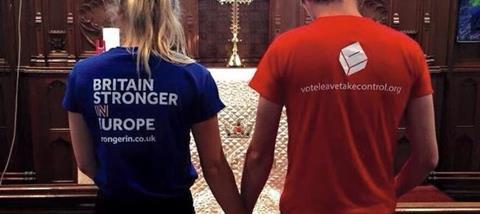
Unity has never been as important is it is today. In the wake of the vote to leave the European Union there are likely to be over 16 million people disappointed and 17 million pleased, so the task ahead of us, as a country and in the Church, has to be to find a way to come together.
The uncertainty of the immediate aftermath of the referendum will not go away anytime soon. Over the summer we will have months of speculation and competition between candidates wanting to lead the Conservative Party and become the next prime minister, and once that’s resolved there will be at least two years of negotiations around our future relationship with our European neighbours.
There will be political instability as the work of parliament shifts dramatically to rewriting the law which we’ve been told throughout the campaign we get from Brussels. I suspect we'll want to keep most of those laws, but they will now require passing through parliament.
And all that’s before we consider the anxiety over what the markets will do in the days to come, and the long term impact that could have on our economy.
In uncertain times we find assurance that we follow the Prince of Peace, who brings us peace but also calls us to the work of peace-making. This is not just a trite phrase to trot out when we don’t know what’s coming next, it’s a vital truth that we hold to. It is also a task we must commit ourselves to, one that requires effort in our country, our communities and our churches.
As a country, and as Christians, this is a time for unity, and that unity doesn't mean ignoring the deep disagreements exposed by the referendum. We have seen deep divisions between parts of our country, with London, Scotland and Northern Ireland voting to remain and Wales and the rest of England backing leave. We have also seen a significant split between generations over support for leaving the EU. The work of reconciliation requires that we are honest about these very real disagreements, we cannot pretend that other people think the same as we do.
Too often we've swept politics under the altar table, as something out of place in church
As we work to provide a voice of unity to our nations, the Church must make space for political disagreement. Too often we've swept politics under the altar table, as something out of place in church. That is not the answer. My hunch is that the Church across the UK split along similar lines as the wider population. This means for some congregations it seemed everyone was backing leave and for others remain had the consensus.
We've got to build unity in the transparency of disagreement. This is a task we have to do prayerfully and practically. We are past the time for good sentiments and symbolic gestures.
The next few years will provide an opportunity to shape the future of the United Kingdom and as a Church it’s essential we play a role in that.
Our unity must always be for a purpose, it’s not a garden party type of civility that ignores what’s really going on.
Our unity must drive our mission, it is what provides us with the impetus to make Jesus known in our communities and across the country.
Our unity must always be for a purpose, it’s not a garden party type of civility that ignores what’s really going on
Our unity can provide a platform to present a vision for society of what the UK can look like in the future, how we can all contribute to a more vibrant public culture, how society can look after the marginalised, and how justice can done and peace can be known.
Perhaps, we can also take a little more responsibility ourselves. Politics is important, but there is so much more than politics. Our engagement in public life happens in schools and community centres, in business that we start and factories we work in. It happens in the pulpits we preach in and the communities we care for.
A united Church for the United Kingdom can be a witness to the power of the gospel, a witness that we needed before the vote and we still need tomorrow.
Danny Webster is advocacy and media manager at the Evangelical Alliance



























